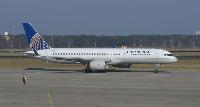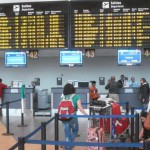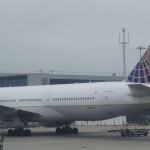Continental Airlines (NYSE: CAL) expects to record $77 million of special charges during the fourth quarter of 2009 ($145 million for the full year 2009). Continental also expects to record a non-cash income tax benefit during the fourth quarter of 2009 and for the year ended Dec. 31, 2009.
HOUSTON – Special items for the three months ending Dec. 31, 2009 and for full year 2009 are as follows in millions:
Three
Months Year
Ended Ended
Dec. 31, Dec. 31,
2009 2009
--------- ---------
Aircraft-related charges $36 $89
Pension plan settlement
charges 29 29
Severance - 5
Route impairment and
other 12 22
--- ---
Total special charges $77 $145
=== ====
Income tax benefit * *
* - amount to be announced as part of our
fourth quarter results.
Aircraft-related charges. The aircraft-related charges in the fourth quarter of 2009 consist of a $23 million non-cash charge to write down to fair value certain 737-300 and 737-500 aircraft and spare parts and a $13 million loss on the sublease of eight EMB-145 aircraft. In June 2008, Continental announced its decision to retire all of its Boeing 737-300 aircraft and a significant portion of its Boeing 737-500 aircraft by the end of 2009. As of Dec. 31, 2009, the company had removed a majority of its 737-300 fleet from service. The 737-300 and 737-500 aircraft fleets and spare parts, a portion of which was being sold on consignment, experienced further declines in fair values during the fourth quarter of 2009 primarily as a result of additional 737s being grounded by other airlines. The $13 million loss on the sublease of eight EMB-145 aircraft was based on the difference between the sublease rental income and the contracted rental payments on those aircraft during the two and one-half year average initial term of the related sublease agreement.
For the full year 2009, the $89 million in aircraft-related special charges consists of $31 million of non-cash impairments of owned 737-300 and 737-500 aircraft and related assets, $39 million of other charges related to the grounding and sale of 737-300 and 737-500 aircraft and the write-off of certain obsolete spare parts, and $19 million of losses related to subleasing regional jets.
Pension plan settlement charges. The pension plan settlement charges relate to lump-sum distributions from Continental’s pilot-only frozen defined benefit plan. Accounting rules require the use of settlement accounting if, for a given year, lump sum distributions exceed the total of the service cost and interest cost components of the current year’s pension expense for the plan. Under settlement accounting, unrecognized plan gains or losses must be recognized in the current period in proportion to the percentage reduction of the plan’s projected benefit obligation from these lump sum distributions. Continental will recognize $29 million of unrecognized plan losses for the fourth quarter and full year 2009.
Severance. Continental incurred $5 million in costs for severance and continuing medical coverage benefits for employees accepting company-offered leaves of absence during 2009.
Route impairment and other. During the fourth quarter of 2009, the company recorded a $12 million non-cash charge to write off several intangible route assets. In September 2006, the Financial Accounting Standards Board issued guidance that defines fair value and establishes a framework for measuring fair value. This guidance was effective Jan. 1, 2009 for all non-financial assets. Application of the new rules affected Continental’s annual impairment testing of international routes, which the company performs as of Oct. 1 of each year. International routes, which are indefinite-lived intangible assets, represent the right to fly between cities in the United States and foreign countries. In prior years, Continental determined the fair value of each route by modeling the expected future discounted cash flows associated with such routes. With the adoption of new accounting rules, fair value is now determined based on the price that would be received by a seller of the route in an orderly transaction between market participants based on the highest and best use of the asset. The special charge of $12 million in the fourth quarter of 2009 represents the write-off of the net book value associated with certain routes to countries that are subject to „open skies“ agreements and where there were no significant barriers to the ability of new entrants to serve the international destination, such as airport slot restrictions or gate availability.
Prior to the fourth quarter of 2009, Continental recorded an additional $10 million of other special charges that related primarily to an adjustment to the company’s reserve for unused facilities due to reductions in expected sublease income for a maintenance hangar in Denver.
Income taxes. The company will record a non-cash income tax benefit from continuing operations during the fourth quarter of 2009. Under current accounting rules, the company is required to consider all items (including items recorded in other comprehensive income) in determining the amount of tax benefit that results from a loss from continuing operations and that should be allocated to continuing operations. As a result, the company will record a tax benefit on the loss from continuing operations for the year, which will be exactly offset by income tax expense on other comprehensive income. However, while the income tax benefit from continuing operations is reported on the income statement, the income tax expense on other comprehensive income is recorded directly to other comprehensive income, which is a component of stockholders‘ equity. Because the income tax expense on other comprehensive income is equal to the income tax benefit from continuing operations, the company’s year-end net deferred tax position is not impacted by this tax allocation.
Picture: Carstino Delmonte/ Touristikpresse.net







